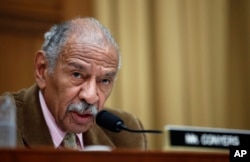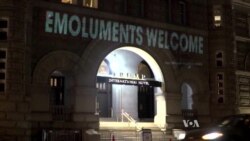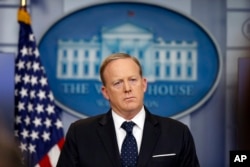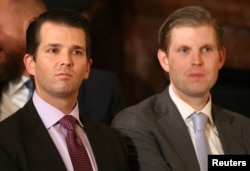Members of the U.S. Congress met with reporters Tuesday to explain their claim that President Donald Trump violated the Constitution for accepting funds from foreign governments through his businesses without congressional approval.
Last week nearly 200 Democratic lawmakers filed suit against the president in federal court over the payments that hundreds of Trump businesses have received from foreign governments since the presidential inauguration five months ago. The legal action contends Trump and his representatives have concealed the extent and the amount of the payments.
“The Constitution of the United States says Congress must consent,” Senator Richard Blumenthal said at Tuesday's news conference. “We cannot consent to what we don't know. We cannot consent to what Donald Trump has concealed, and he owes the Congress that disclosure.”
Trump 'either doesn't know or doesn't care'
Congressman John Conyers of the House Judiciary Committee said he and other Democratic colleagues have written to Trump on multiple occasions, seeking information about the foreign payments. They have not received a response, Conyers said, adding: “Look, it boils down to this: he either doesn't know or doesn't care.”
At issue is the Constitution's “foreign emoluments” clause, which prohibits public officials from receiving payments and other gifts from foreign governments with congressional approval.
'Uncharted territory'
The founding founders of the United States, who drafted the Declaration of Independence from Britain and the U.S. Constitution more than 200 years ago, worried that wealthy foreign countries would bribe public leaders of the new nation, Senator Tom Udall said, so they included the emoluments clause in the Constitution to preserve and protect the country's sovereignty.
“As with many things, President Trump has taken us into uncharted territory,” Udall said. “Today, because of his continued and unknown business interests, we don't know what motivates President Trump's decision making.”
Similar lawsuits have been filed against Trump in recent months, including an action brought by the attorneys general of Maryland and the District of Columbia, home of the nation's capital.
'Partisan politics'
The suits claim that Trump's acceptance of payments from foreign and U.S. governments through his hotels and other hospitality businesses put competitors at an unfair disadvantage and incentivized governments to give Trump's businesses special treatment.
In a motion earlier this month seeking dismissal of one of the private lawsuits, the Justice Department contended the plaintiffs failed to show that their businesses suffered any specific harm to their businesses. Government attorneys said Trump is only prohibited from accepting gifts from foreign governments if they were specifically linked to his role as president.
White House press secretary Sean Spicer said “partisan politics” motivated the suits filed by Maryland and Washington, D.C.
Income-tax returns
When Trump entered the White House in January he turned over control of his global business empire to his two adult sons and a senior executive and placed his financial assets in a trust controlled by Donald Trump Jr. and the senior executive. The president can resume control of the trust at any time, and he can withdraw cash from the trust whenever he wants.
Critics contend this arrangement falls far short of divestiture of Trump's assets, or placement of his properties and investments in a blind trust whose proceeds and transactions he can neither influence nor countermand. Such arrangements have been the norm for U.S. presidents for decades, but the structure of Trump's business empire, tightly held and without stockholders' scrutiny, also is quite different from his predecessors' holdings.
The president's finances also have drawn scrutiny because he has refused to release copies of his income-tax returns, departing from another well-established custom of American public office-holders. Without such information the general public and news media lack detailed, verified financial information about the president's income, assets and debts.










